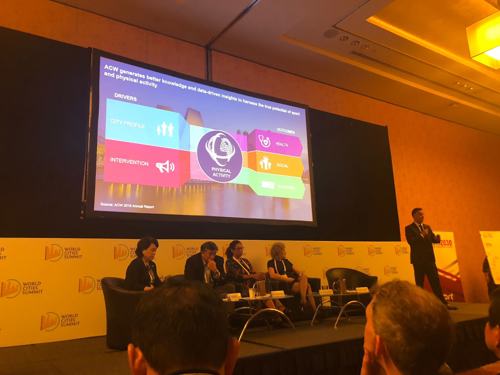Following the launch of Active Citizens Worldwide (ACW) in February 2018, representatives from the programme’s Founding Cities of London, Auckland and Singapore came together to release the first Annual ACW Report at the World Cities Summit in Singapore. It was also announced that Stockholm has become the latest city to join the ACW network.
Active Citizens Worldwide is a global initiative set up to help cities across the world achieve a step-change in the physical activity levels of its citizens. ACW uses data and analytics to provide policymakers with better knowledge, insights and ideas, and through multi-city collaboration, best-practice sharing and global benchmarking, help transform the physical activity profiles of their cities.
Under the theme of “social resilience”, the Founding Cities of ACW came together to share the findings from the first year of collaboration, and discuss how sport and physical activity can further contribute to social resilience at the individual, community and city level.
Building on existing metrics and indicators, the cities identified a need and an opportunity to design and introduce an improved way of measuring sport and physical activity participation that is non-binary, globally consistent, and incorporates measures across the three key dimensions of type of activity, duration, and intensity.
The Annual Report covers the key insights and findings on the current situation, what is driving physical activity, and what is the estimated value of physical activity across the three cities. (Download the full report at www.activecitizens.world)
For the three cities combined, the total annual value of participation in sport and physical activity is estimated at US$16.4bn, which includes:
- Annual health-related benefits: US$513m in healthcare savings; US$622m boost in productivity; over 2,000 deaths prevented; and 68,000 Disability-Adjusted Life Years (DALYs) saved.
- Annual direct and indirect economic impact: US$15.2bn through participation consumption (US$9.6bn) and workforce contribution (US$5.6bn). This represents up to 2% of the GDP for cities.
- Annual value of societal benefits: US$3.5m through crime prevention, US$60m from improved educational attainment; over 1bn hours of positive social interaction; and a 4% increase on self-rated happiness.
Analysis also showed that greatest variations in the levels of physical activity are related to socio-economic factors. In ACW cities, people from lower socio-economic status are as much as 30% less active than people from the higher statuses.
Across all three cities, older people tend to be less active than their younger counterparts but different rates of decline indicate that it is not necessarily age per se that entirely drives propensity for physical activity, but age-specific lifestyle factors, such as the role of schools and education programmes for kids or the work/life decisions for adults.
A new analysis, relating to the relative impact of different factors on an individual’s propensity to be physically active that takes into consideration their socio-demographic profile, has started to shed light on what specific interventions are most effective for different target groups, e.g. public facilities in the most deprived areas of London.
The ACW findings from the first year have already helped to secure bigger budgets for sport and physical activity in one city and redesigning physical activity surveys in another.
Mr Lim Teck Yin, Chief Executive Officer of Sport Singapore said: “Through this project and cross sharing between the cities, we will strengthen evidence-based decisions towards Vision 2030 – our roadmap for using sport as a strategy to serve the nation, communities, businesses and individuals. There is much we can learn from the other Founding Cities, and it is also timely that we take stock of our progress thus far to see which areas need more attention. We will be engaging our stakeholders and partners as we work through the follow-ups from the first year’s report.”
Dr Sarah Sandley, Chief Executive of Aktive – Auckland Sport & Recreation said: “Aktive is committed to helping people and communities across Auckland to achieve sport and recreation habits for life – an important part of this is engaging with and learning from others. The information and insights in the inaugural Active Citizens Worldwide Annual Report will further support us and our partners with practical initiatives to deliver growth in physical activity. We’re excited about this first step and look forward to building on this successful collaboration.”
Tove Okunniwa, Chief Executive of London Sport, said: “The analysis contained within the first Active Citizens Worldwide Annual Report paints a compelling picture of the value of physical activity and sport in cities across the world. The commonalities and the differences we see across Auckland, London and Singapore are instructive in enhancing our understanding of what currently works well for physical activity, as well as areas that may require new thinking, if we are to successfully support all Londoners to live physically active lives.”
Building on a highly successful first year, the second year of ACW will see new cities joining the programme as we look to expand both the breadth and depth of ACW.
Download the full report at www.activecitizens.world.
To learn more please visit our website or contact the team at info@activecitizens.world.

